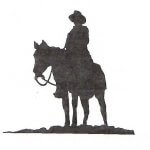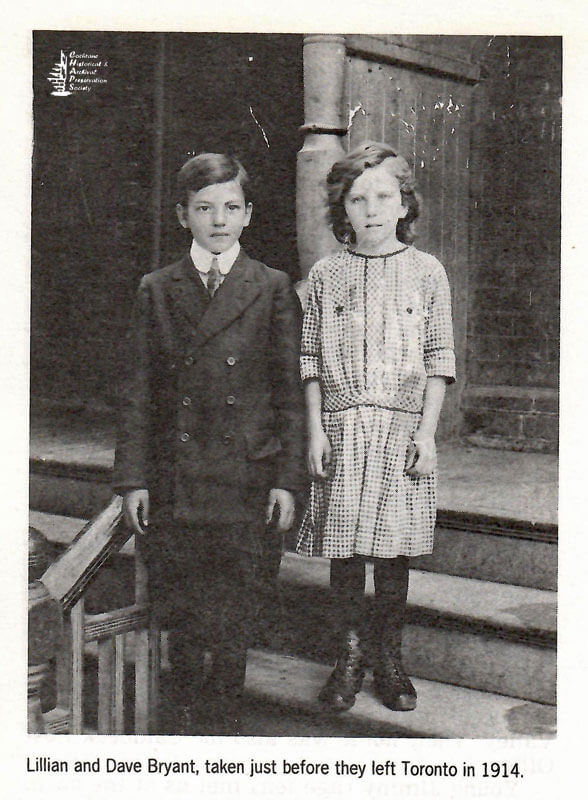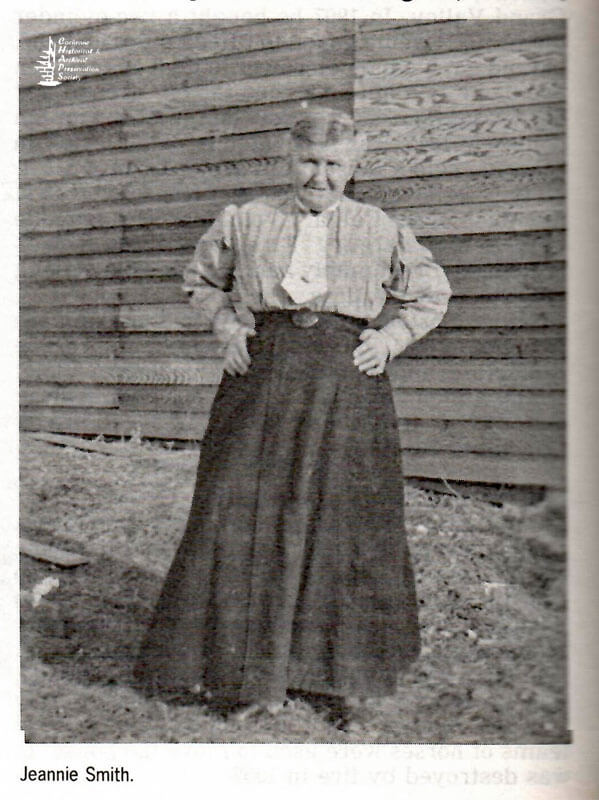by Dave Bryant pg 359 Big Hill Country 1977
I was born in London, England, on May 1, 1903, and came to Toronto, Ontario, in 1907. My mother was born in Scotland and my father was born in Ireland. I have two brothers and two sisters.
My sister Lillian and I came to Cochrane from Toronto in September 1914. I was eleven years old, she was eight. Our father had been electrocuted while wiring a hotel in Toronto. Our uncle at Cochrane, Jimmy Patterson, sent two tickets to my mother and asked her to let two of her children come and live with his family. My mother kept the tickets for almost a year before she would let us come. We traveled for three days and three nights by train. Lillian soon became homesick and cried nearly all the way. Someone had given me a pair of gauntlet gloves before I left Toronto. One day I opened the window of the train and held my hand out. The cinders from the engine blew back and burned small holes in my gloves. This almost ruined my trip out West.
Mrs. Patterson and Mrs. Darke met us at the station. We drove eleven miles with a team and democrat to the Patterson ranch in Grand Valley. Their home was also the Caldbeck Post Office.
Young Jimmy (age ten) met us at the barn. He was wheeling a wheelbarrow load of hay to the cows. He set the wheelbarrow down, looked me over, and with a grin as broad as himself, asked me if I could swear. I told him I thought I could a little bit. We were good friends from then on. He took me to the house where I met Jeannie Smith, a Scottish lady, who had lived with the Pattersons for several years. She was very strict and her first glance made me feel like Oliver Twist. Jimmy did not mind her a bit. It was nothing to come to the house just in time to see Jimmy running out the door with Jeannie after him, shouting, “The deevil is in yar fangers, ye kinna lev nethin alane! I sweer I’ll tell Pettersin on ye.”
There were two boys, Donald and Jimmy, in the Patterson family and we three boys slept in one bed. Jeannie woke everyone in the morning by rapping on the door with her cane. I could hear her shout, “Pettersin aer ye up?” Apparently Jeannie was to wake us and judging by the dint in the door she had not shirked her duty.
As we dressed I could not help noticing the socks the boys were wearing. When we came out of the bedroom, Jeannie had breakfast ready and was standing at the stove stirring a huge pot of oatmeal porridge with a wooden stick. After breakfast, I soon learned the secret of good socks. Every time Mrs. Patterson or Jeannie had a moment to spare, they would sit and knit. The main knitting needle was inserted into a ball (about the size of a softball) of hard-packed
prairie wool hay, tightly wrapped in cord and placed on their laps; then they would knit so fast you could almost see the socks grow.
I remember my aunt best when I think of loaves and loaves of delicious homemade bread, and cows and more cows to milk. When Ruth Hinde was born, Mrs. Patterson went to help. Jimmy and I started to milk cows at seven in the morning and finished at two in the afternoon. Jimmy said, “What will we do now?” I decided we had better start over again. After much puffing and sighing, we did.
Shortly after Lillian and I started to attend Chapelton School, we were riding double bareback and I wanted the horse to trot. Lillian lost her balance and we fell off and I broke my arm. Uncle Jimmy took me to Cochrane. The doctor was out so Bob Chapman took me to a ranch south of Cochrane, where Dr. Ritchie and his son set my arm without giving me any anesthetic. Later I went to the West Brook one-room school.
When I was fourteen I raked hay for Gordon Hinde, manager of the Rhodes Ranch in Grand Valley, for one dollar a day. During the War, I took a flatrack of wool to Crossfield for Chris Larson. Ab Banta also raised sheep and his hired man took a load in for Ab. We each drove a four-horse team. It was a two-day trip and as we did not have any money we slept in a Chinese cafe all night. The next day we each tied one team behind
our rack and headed for home. On the way home I gave a girl a ride for two miles. She sat in the far corner of the rack and never spoke. I’m still wondering who she was. During the hard winter of 1919 I fed cattle for Bill Tempany. In the spring of 1920, I went to work at the Virginia Ranch for T. B. Jenkinson. Mrs. Oldaker was the housekeeper and she was an excellent cook.
Late in the fall of 1920, sadness struck the Patterson home when Jimmy took sick with scarlet fever and developed infected mastoids and pneumonia. The roads were very bad and Mr. and Mrs. Patterson rented a house and moved Jimmy to Cochrane so that Dr. Waite and Dr. Park could do all they could to save him. Anne Beynon was his nurse and stayed with him night and day. When all hope for Jimmy’s recovery was given up, Mr. Patterson, Donald, and I rode horseback to Cochrane to see Jimmy. We stayed in Cochrane overnight and our neighbor Clem Edge did the chores. Jimmy was propped up in bed so we could see him through the window. As all hope had been given up for Jimmy, Dr. Waite decided to try one more thing. He lanced Jimmy’s lung to drain away the fluid. Suddenly, Jim- my started to get better. Although he lost his hearing, he soon regained his health and there was happiness in the Patterson home once more.
In 1921 I worked for Paul Swanson on the irrigation ditch at Barnes in Southern Alberta. Don Patterson, Bill Hughes, Pat Kerfoot, and I spent several falls pitching bundles for large steam threshing outfits in the Langdon, Cheadle,
and the High River areas. In 1923 Don Patterson and I worked for Mr. and Mrs. Dave McDougall. Although they had a large family of their own, they always referred to us as their boys.
It wasn’t all work and no play in those days either. I often rode to dances held in Cochrane or in schoolhouses. I could ride from Pattersons across country to the Summit Hill School without opening a gate. One night I thought I would leave early and have supper with Susan and Jim Reeve. After supper, I admitted to Susan that I was sweet on the teacher at Summit Hill. Susan was aghast and replied, “Dave, she can’t even milk cows!”
Late in 1923 I went back to Toronto and worked six-and-one-half years for General Motors of Canada at Oshawa, Ontario. My mother passed away in 1929, and I returned to Cochrane and went to work on the Dog Pound and Lochend roads for George Woodson. All the road work was done with horses and a Fresno or a walking plow.
I bought a team of my own and drove them to Lake Louise to work on the highway. When there was no roadwork, I worked for Andy Garson, Tom Baptie, Chappy Clarkson, and Archie Kerfoot. In the winter of 1934, after working on the road at Lake Louise, Bill Melleck and I drove our teams back to Seebe to work in the relief camp. Food, clothing, hay, and oats were paid for by the Government. We were paid 20 a day for our work and 80 a day for our team. It was twenty degrees below zero when we left Pattersons, and I drove my team and walked beside my wagon almost forty miles to Seebe. Bill had asthma so bad he could not walk and he nearly froze to death before we got there.
In 1933 I bought a quarter section of Hudson’s Bay land, NW4 26-27-5-5, in Grand Valley for $8.00 per acre, where my wife and I still reside.
In the 1930s taxes were low but hard to pay. You could pay part of your taxes by working on the road, which I did. One year the Social Credit Government paid us with scrip. Scrip and stinkweed were often referred to as “Aberhart’s Alfalfa.” William Aberhart was Premier of Alberta at the time.
On September 10, 1936, Ellen Ullery and I were married by Reverend Dr. McKeen Reid, at my home in Grand Valley. We have three children: David Earl, married to Betty Grievson; Dorothy May, married to Donald Edge; and Lillian Ethel, who married Harvey Short from Winnipeg, Manitoba. Lillian is now married to Gary Gingles from Exshaw. We have three grandchildren, Gary and Bary Bryant and Dallas Anita Short.
David has his own road construction business and builds roads in the Cochrane and Calgary areas. Dorothy has been a secretary for Mobil Oil of Canada, Ltd. for seventeen years. Lillian is also a secretary and works for Alberta Natural Gas Company at their plant just northwest of Cochrane.
My sister Lillian went back to Ontario when she was eighteen and married Robert Colquhoun. They have three children, Bob, Ron, and Joan, and eight grandchildren: Bob and Shirley’s children, Robert and Craig; Ron and Audrey’s children, Laura, Betty, Barbara, and Allan; Don and Joan Gruber’s children, Sheena and Tasha Dawn. Allan passed away at the age of eight due to a riding accident. Lillian, now a widow, loves to visit the West and drive up the Grand Valley road. She often recalls the times the Patterson boys would tease her until she cried, then hug her and say, “Now, now, wee womany, don’t cry.”



